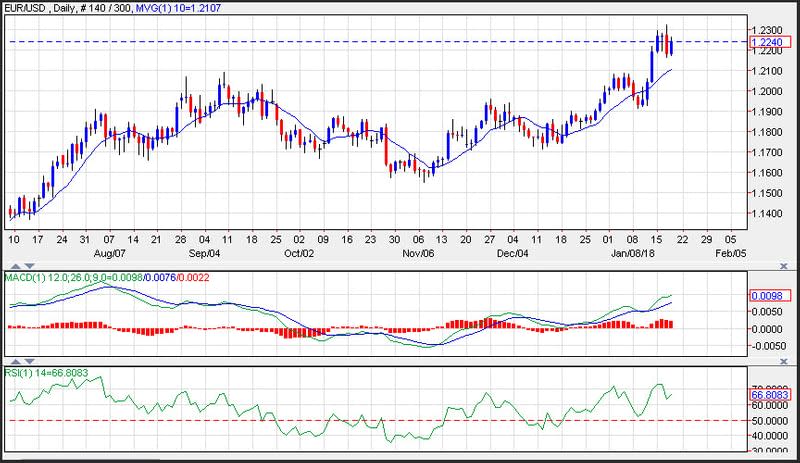EUR/USD Daily Technical Analysis for January 19, 2018
The EUR/USD continued to consolidated at higher levels, following housing number in the Eurozone that showed inflation was accelerating. While U.S. jobless claims dropped showing employment strength, housing sales tumbled which weighed on the greenback.
Technicals
The EUR/USD rebounded from session lows closing up on the day, and forming an inside day where the higher is lower than the prior days high and the low was higher than the prior days low. Prices appear to be forming a bull flag pattern which is a pause that refreshes higher. Support is seen near the 10-day moving average at 1.2107. Resistance is seen near the weekly highs at 1.2323. Momentum remains positive as the MACD (moving average convergence divergence) histogram prints in the black with an upward sloping trajectory which points to a higher exchange rate.

Eurozone Housing Price Inflation Accelerated
Eurozone house price inflation accelerated in Q3 last year. Official Eurostat data for the third quarter of 2017 shows overall Eurozone house prices rising 1.7% quarter over quarter, up from 1.4% quarter over quarter in Q2 and bringing the annual rate to 4.1% year over year, from 3.7% year over year in the previous quarter. The data will add to concerns that the ECB’s ultra-accommodative monetary policy is fueling asset price bubbles, although at least in Germany, increases are starting to slow down, with the annual rate falling back to 3.6% in Q3, below the Eurozone average and sharply down from the 6.9% year over year in the last quarter of 2016. Ireland, Portugal and the Netherlands meanwhile saw double digit house price increases and the Spanish rate accelerated to 6.7% year over year in Q3, so Draghi’s critics have a point.
Eurozone car registrations slowed in December
Eurozone car registrations slowed in December, with the annual rate falling back to 4.4% year over year from 8.7% year over year in the previous month. The three months trend remains strong and car registrations went up in Q4 compared to Q3, adding to signs that overall economy growth remained robust.
Weidmann defends German surpluses
The Bundesbank President hit back at criticism of Germany’s current account and budget surpluses from IMF’s Lagarde, saying that merely raising public spending purely to tackle the issue would “likely be a futile undertaking” stressing that Germany doesn’t need more spending, but a “shift in public expenditure from consumption to investment”. We agree, and in fact for once this was not an export led recovery, but one initially driven by domestic demand and consumption.
UK house prices unexpectedly picked up in December
UK house prices unexpectedly picked up in December after posting a four-year low in November, according to the RICS house price index. The gauge rose to a headline reading of +8 in December, up from a zero reading in the month prior, which was the lowest since March. The UK property market has over the last year been curtailed by affordability issues on the demand side, but still underpinned by chronic constraints on the supply side.
Chicago Fed dove Evans is bullish on the economy
Chicago Fed dove Evans is bullish on the economy which he says continues to do “extremely well,” though the biggest challenge remains low inflation, which needs to be boosted to 2%. He anticipates stronger business investment this year, which should sustain a boost in growth the next couple of years. Evans doesn’t view the increase in the deficit from tax cuts as sustainable longer-term, while he wouldn’t be surprised if the unemployment rate tipped below 4.0% in 2018.
U.S. initial jobless claims plunged
U.S. initial jobless claims plunged 41k to 220k in the week ended January 13 following the prior week’s 11k jump to 261k. The outsized drop suggests some volatility from the holidays, weather, and other distortions. The 4-week moving average declined to 244.5k versus 250.75k. Continuing jobless claims climbed 76k to 1,952k in the January 6 week after sinking 29k to 1,876k in the last week of December which was revised from 1,867k and the 43k plunge to 1,905k which was revised from 1,902k in the December 23 week.
U.S. housing starts dropped
U.S. housing starts dropped 8.2% to 1.192 million in December following the 3.0% November increase to 1.299 million which was revised from 1.297 million. Single family sales sunk 11.8% to 0.836 million after the6.9% prior gain to 0.948 million which was revised from 0.930 million. Multifamily starts increased 1.4% to 0.356 million after tumbling 6.1% to 0.351 million which was revised from 0.367 million. Building permits dipped 0.1% to 1.302 million following a revised 1.0% decline to 1.303 million which was 1.298 million.
This article was originally posted on FX Empire

 Yahoo Finance
Yahoo Finance 